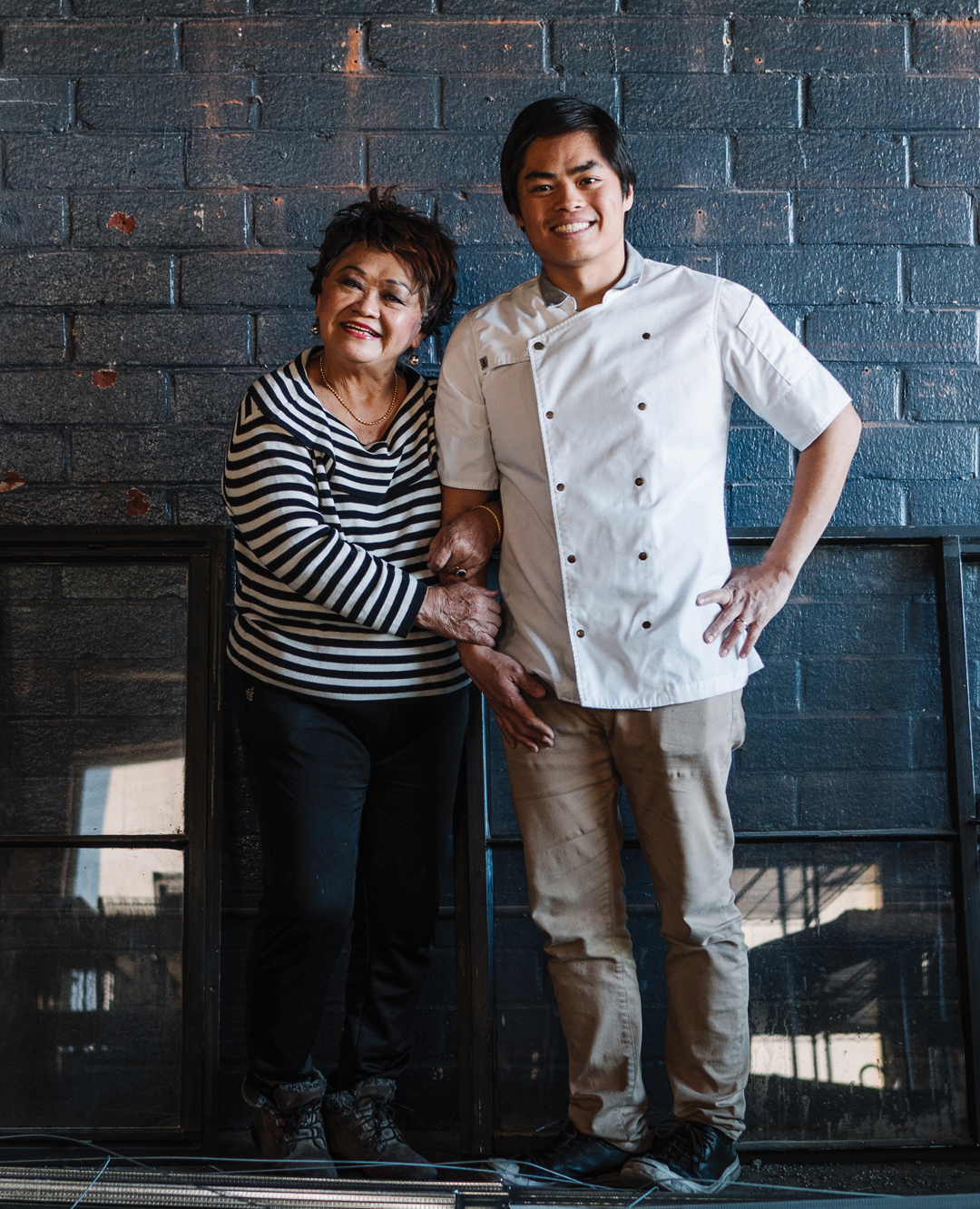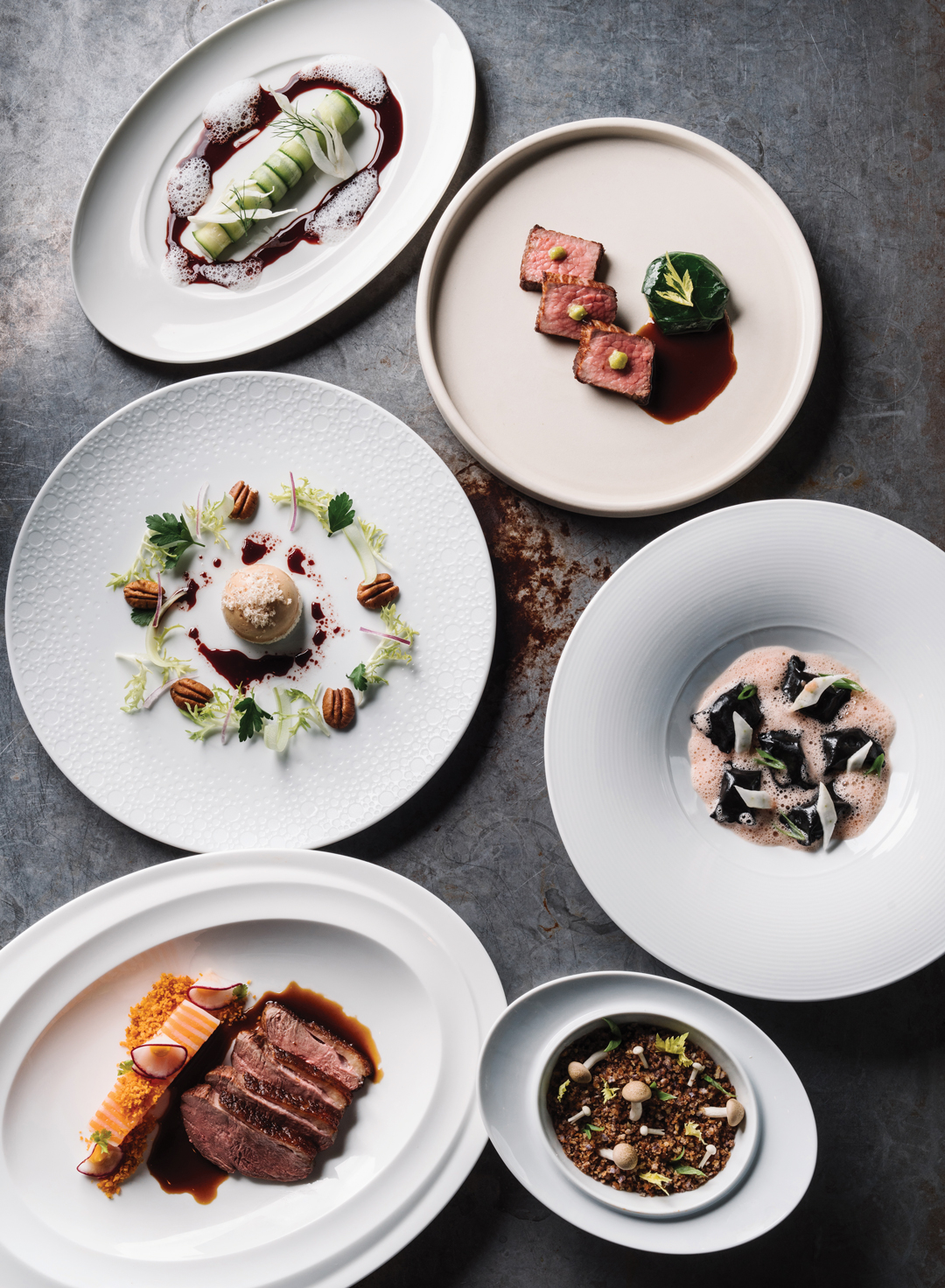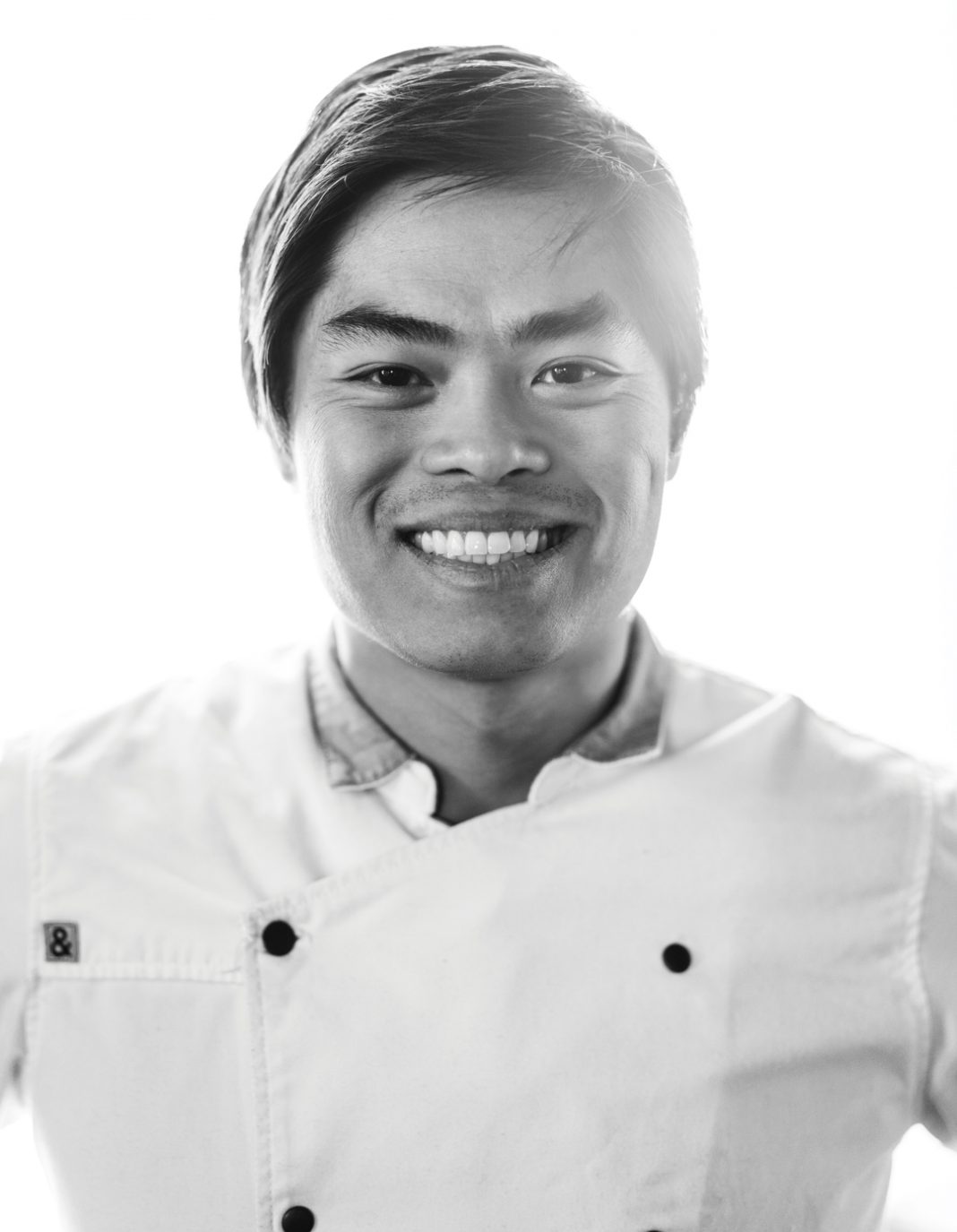Chef Ron Hsu / Photograph by Andrew Thomas Lee
When Ron Hsu was a kid, the school bus would drop him off at Hunan Village, his parents’ Stockbridge restaurant. His job was to peel onions. “The bag of onions was bigger than me,” he recalls. At home, he loved to help his Chinese grandmother make a chicken stir-fry with garlic, ginger, fermented black beans, and soy. They didn’t start sourcing ingredients in the grocery aisle but in the family chicken pen. “I would chase chickens into her arms,” he says, “and she would kill them and hang them from our roof to bleed.” When his friends asked him what the dead chickens were, he told them: “Dinner.”
“It never occurred to me that it was strange until I got older.”
Like innumerable children of immigrants, the 37-year-old chef has spent most of his life straddling cultures. Now, he’s putting his diverse experiences to work at his first restaurant, Lazy Betty—an ambitious concept in the old Radial Cafe space on DeKalb Avenue that’s been carefully conceived and test-piloted for the Atlanta market with an exhaustive, year-long pop-up series of the same name. A restaurant centered on a seven- to nine-course tasting menu at $115 to $125 a head can be a challenge, but no one can quibble with Hsu’s credentials, his competitive nature, or his will to succeed. Before coming home to launch Lazy Betty, he studied French cuisine in Australia, held a top creative position at New York’s super-high-end Le Bernardin, and gained global exposure when he recently competed on Netflix’s The Final Table.
His vision for Lazy Betty couldn’t be more unlike the seven Chinese restaurants his parents ran from 1980 until 2008. Yet those restaurants, and the family hustle that made them successful, are Lazy Betty’s foundation.
As one of the few Asian kids at Stockbridge Middle School, Ron remembers being bullied: “One very vivid memory is, when I went to a public swimming pool, another kid that was like my age came up to me and spat on me and made racial slurs.” He had a better experience at Woodward Academy, where he was voted class president in 2000. He attributes his victory to his aunt’s homemade fortune cookies; she inserted a fortune that said: “Vote for Ronald.”
Having a mother who ran a Chinese restaurant probably didn’t hurt his popularity, either. Betty Hsu—a tough-love mom with a sparkplug personality and a soft heart—knew how to curry favor with her kids’ friends. She remembers how they’d arrive at Hunan Village and squeal: “Mama Hsu, I’m hungry!” She’d feed them Mongolian beef and Mandarin ribs. But she never charged them. “I treat them just like my sons, you know?”

Photograph by Andrew Thomas Lee
Today, her former customers still make a point of greeting the matriarch when she holds court at Sweet Auburn Barbecue, the Poncey-Highland restaurant (there’s also a stall at Sweet Auburn Curb Market) founded by her two other children, Howard and Anita, in 2014. Ron intends to continue the Hsu tradition of treating customers like family at Lazy Betty, where Howard and Anita are managing partners. The name is a winking reference to Betty Hsu’s tireless work ethic. “She’s not really lazy at all!” Ron says.
Nor is Ron, who understands his new restaurant’s high stakes. “A tasting menu–only restaurant in Atlanta is risky,” he says. “We’ll probably be one of the more expensive restaurants right off the bat. When I was in Atlanta, restaurants like Joël and Seeger’s weren’t very successful. Those were considered the heavyweights back then, and they didn’t make it long.” (Seeger’s was open nine years; Joël, nearly eight.)
But the city is a more sophisticated place than it was when Ron left in 2006, as evidenced by the success of restaurants like the tasting menu–only Staplehouse (which also began as a pop-up). His pop-up experience only reinforced that. “I love that Atlanta has come so far in such a short amount of time,” he says, “and that I can really cook the food that I enjoy cooking and kind of push the boundaries.”
It’s a dreary autumn day at the tidy Virginia-Highland bungalow Ron shares with his wife, Jackie, and their newborn daughter, Calliope. Jackie, who has a PhD in finance from Yale, is an economist for the Federal Reserve Bank of New York and telecommutes. She met Ron in New York on her first Tinder foray. Jackie remembers the first time her new boyfriend cooked for her. “Ron made spaghetti carbonara,” she says. “He made me bring over, like, three containers of creme fraiche just for the two of us for his very fancy carbonara.”
“It’s a nontraditional version,” he interjects. “My French version of carbonara.”
As Betty Hsu coos over her new grandbaby (“She’s so smart!”), Ron steams some of her trademark, pork-filled dumplings. “These are one of the first things I learned to make in my mom’s restaurant,” he says. “Every Saturday, we would have two gigantic tubs of meat already mixed with my mom’s seasoning, and we all had our specific role in the dumpling-making process.”
Ron has recently wrapped up the pop-ups to focus on his newborn baby and restaurant build-out. Back in New York, he’d dabbled in supper club–style meals at a friend’s house and at a bar. His Atlanta endeavor was more purposeful: a dress rehearsal for a brick-and-mortar in a market where he hadn’t worked for 11 years. It allowed him time to “test the waters,” create buzz, experiment with recipes, and establish relationships with farmers. In the end, he says, it also helped him find his core staff, develop a mailing list of devotees, and get a read on what Atlanta diners want.
“I’m not a purist. I’m Chinese. I grew up in the South and went to a French cooking school, so my cooking is reflective of who I am and how I grew up. I think cuisines are just going to naturally mix just like people naturally mix.”
The pop-ups essentially were the final round of practice for a dream nearly 20 years in the making. Back in high school, Ron had told his mother he wanted to go to culinary school. Betty, who refers to herself with pride as a “Tiger mom,” insisted he go to “regular college.”
Later, as a miserable University of Georgia business major, Ron continued to nag his mother. He wanted to be a chef. If he was serious, she told him, he needed to find a job in a restaurant kitchen. And so, he worked as a line cook at an Athens pizzeria and, later, a tapas joint.
Eventually, Betty acquiesced, agreeing to help send her son to culinary school in the spring of 2003. Ron already had planned to study abroad in Australia through UGA’s business college. Instead, he enrolled in Le Cordon Bleu in Sydney, eager to soak up the city’s Asian food culture.
A year and a half later, he got kicked out of Australia for an expired visa and returned to Atlanta, where he found work in the kitchen of the late Dish on North Highland Avenue. Dish’s executive chef was Sheri Davis, who’d previously cooked at the now-shuttered Brasserie Le Coze at Lenox Square. The popular French dining room was owned by Gilbert and Maguy Le Coze, founders of Le Bernardin, the three-Michelin-star restaurant in Manhattan that’s generally regarded as one of America’s finest.
After a few months as a line cook at Dish, where he remembers making many batches of rosemary–pine nut popcorn, Ron was promoted to sous chef. When he told Davis he was ready for change, she sent him to Le Bernardin chef Eric Ripert, who hired the 24-year-old as a line cook.
“Right away, we were impressed with his seriousness, his focus,” Ripert says. “He has very good skills in the kitchen because of his background, which is from the restaurant of his family, and we were very happy to have him.”
After seven years—during which Ron worked his way up the Le Bernardin hierarchy to executive sous chef and served a stint on the recipe-development side in the creative department—he left to be executive chef at Le Colonial, a French-Vietnamese restaurant in midtown Manhattan. In a flattering September 2014 review that also mentioned a Bruce Springsteen sighting at Le Colonial, the New York Post said of the rising star: “Unlike certain stock-stirrers who boast of prior four-star affiliations, Hsu is no mere cook but a master of crowd-pleasing styles.”
Two years later, Ripert hired him back, this time as creative director of Le Bernardin. Ripert remembers his protege conjuring an “amazing octopus dish with fermented black beans.” Ripert says he’d never heard of the Chinese ingredient. (Thanks, grandma.)
Ron doesn’t see himself as an Asian chef but as one with multiple influences (Chinese, Southern, French, and Japanese). “I’m not a purist. I’m Chinese. I grew up in the South and went to a French cooking school, so my cooking is reflective of who I am and how I grew up. I think cuisines are just going to naturally mix just like people naturally mix.”

Photograph by Andrew Thomas Lee
At Lazy Betty, Ron wants to tell his life’s story as a tasting menu. He likens the chef-curated dining experience to listening to Pink Floyd. You might like one song—but take in an entire album, and your mind is blown.
As a meal progresses at Lazy Betty, Ron might nod to his early experience in Italian mom-and-pops (cucumber cannelloni filled with horseradish panna cotta); his affinity for Japanese cuisine (snapper tartare with puffed sushi rice); and his family’s fondness for Waffle House, where they often repaired after late nights in their restaurants (a rarefied take with wagyu steak alongside a sous vide egg yolk wrapped in a wasabi leaf).
At a Lazy Betty pop-up over the summer, Howard Hsu greeted patrons and showed them to a table with personalized name cards. After the meal, Ron came out to say hello and ask customers what they thought. (There was also a questionnaire circulated after the meal.)
One thing he learned is that diners crave personal connections; they loved being called by their first names. With his tasting menu, he aims to build deeper bonds. “We want people to have some kind of emotional or intellectual attachment to our product.”
One of the pop-up’s regulars, Marjorie Speers, has known Ron since he was a teenager (he was friends with her son) and has followed his career closely, eating his food at Dish, Le Bernardin, and Le Colonial. “When there is a tasting menu available, I always order it,” Speers says. “I particularly like Ron’s, because they include the right number of courses, and I like the progression, not to mention the surprise of what’s to come.”
His food may be elevated, but the dining room at Lazy Betty won’t be stuffy. Jeans and T-shirts will do. “I never thought that a restaurant with white linen and people wearing very fancy suits promoted getting to know its clientele one on one,” Ron says. “I felt like those kinds of elements in a restaurant created a barrier between the guest and the chef, and we want to knock down those barriers, because it’s a reflection of how we grew up.”
Back at the Hsus’ home on Ponce de Leon Place, the dumplings are ready. Ron brings them to the dining table, which is surrounded by chair samples the family is considering for Lazy Betty. Betty sits in a regal wooden armchair with a leather seat. It’s the one they’ll later choose. She won’t be working at her namesake restaurant, though. As she points out, “I’m too bossy.”
Ron has put out little dishes of his mom’s hot sauce and some fancy smoked soy sauce from Japan:
“Why you not use Kikkoman?” Betty jabs.
“This is very good quality,” Ron replies.
“Better than Kikkoman?” she says.
Ron says the only dish of his that Betty likes is fettuccine Alfredo (she claims to also like his braised oxtails). Grandma loved it, too. When he used to come home from New York, he’d make big batches for his mom to freeze. “My mom, she could eat it for three days,” Betty says.
Ron was very close to his grandmother. As a little boy, he slept on the floor of her room to keep her company, communicating with her in his broken Chinese. He pulls up his sleeve to show off his one tattoo, a band of elaborate Chinese lettering. Betty gushes: “My mother’s name!”
How will Ron ever top the grandma tattoo on his arm? That’s easy: “My mom’s name will be on my butt cheek.”
Back to Underground Dining Guide
This article appears in our February 2019 issue.














